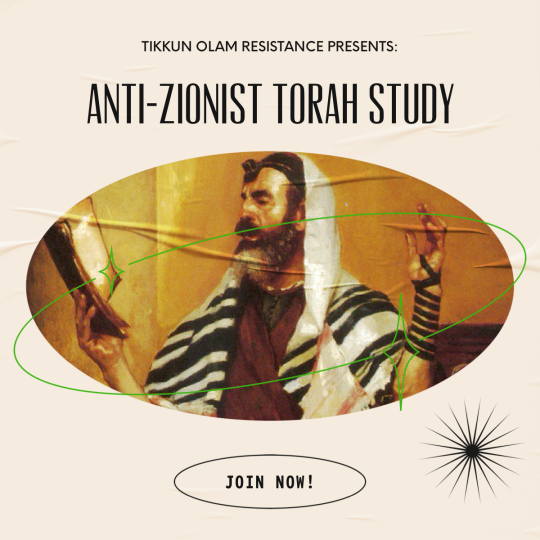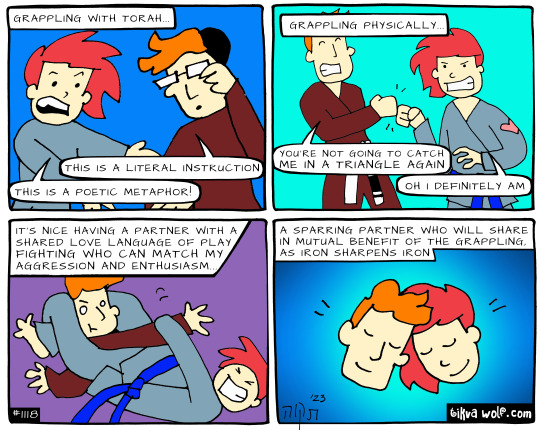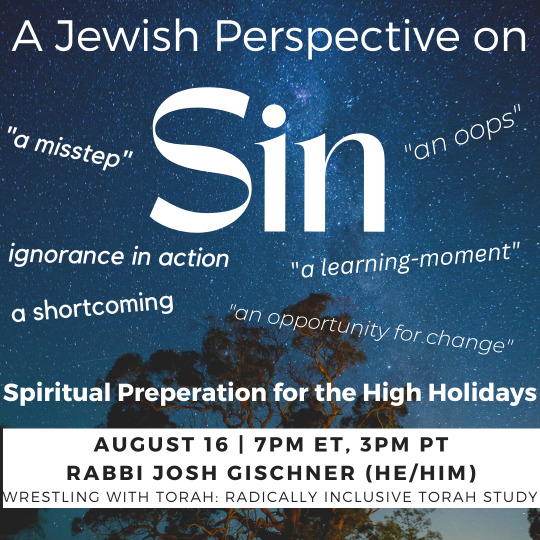#torah study
Text
In this weeks Torah portion, what stands out to us most is “You shall not oppress a stranger, for you know the feelings of the stranger, having yourselves been strangers in the land of Egypt (Exodus 22:20, 23:19).” We must not perpetrate upon other that which was perpetrated upon us.
The epitome of moral obligation, of G-ds word, is to ensure do not carry forward our pain, or pass it like a baton. The memory of bondage must act as revolution, not an excuse.
Pain inflicted in the name of Judaism is an insult to G-d themself. An insult to our people, history, our core beliefs. Zionism is the antithesis of Judaism.
#free palestine#palestine#anti capitalism#anti imperialism#judaism#jumblr#exodus#torah reading#torah study#antizionism
5K notes
·
View notes
Text
you're telling me yaakov """wrestled""" with a """man""" in the wilderness and then changed his name and had sciatica for the rest of his life???
what else gives you sciatica? pregnancy
what else makes you change your name? 🏳️⚧️
who are some people that both change their name and get pregnant? transmascs
wake up the members of my nation i think we're onto something here
489 notes
·
View notes
Text
I'm pretty sure Avraham failed the test
like if I was given a test and the person giving the test very obviously told me that I was wrong and not to actually do the thing, I would assume I failed the test
also, that's about where the torah switches focus from Avraham to Yitzchak. There were no more tests after that, his story just kind of ends. His next big task is to just marry off his son and that's it he's done.
Like, I really don't think he passed that test I think he failed for refusing to question God for giving him a very unreasonable task.
And it's not like others haven't been rewarded for questioning or even fighting authority
like Yaakov is very definitely rewarding for tricking his Dad cause like right after it says he has a dream where God basically told him good job you will have many descendents. Then later on he literally fights an angel and it's a good thing cause he got renamed Israel as part of a blessing and now we're B'nei Israel
And Moshe definitely questioned authority that was like his whole thing. And even beyond Pharoah, he also had to reason with God to get them to not kill everyone.
Even Avraham that time he convinces God to not kill everyone in Sodom and Gomorrah if there are ten good people. There aren't but Avraham's questioning and reasoning with God is portrayed as a good thing.
Also, Judaism is generally very supportive of questioning authority and child sacrifices are very specifically banned in the torah, so It makes no sense that Avraham passed the test because he would've obeyed God even to kill his child. Like that moral is pretty inconsistent with the rest of the Torah.
so I definitely think Avraham failed that test.
#avraham#avraham and yitzchak#abraham#abraham and isaac#jumblr#jewish#torah#torah study#torah commentary
968 notes
·
View notes
Text
#Jackob#Issac#Abraham#Iraq#Palestine#Jews#Bible#torah#torah study#histoire#history#jewish#anti zionisim#palestine#gaza#israel#free palestine#i stand with palestine#jerusalem#فلسطين
229 notes
·
View notes
Text
Radical Inclusion has lived within Jewish texts from the most ancient of our beloved stories, and has been a value that we've been learning from for centuries. Come join the conversation of the ages, inspired by our texts to make our Jewish Family a safer, more inclusive, kinder, and more loving for every last member of our community.
This text study will explore wisdom from the Torah, Medieval Commentators, and Contemporary Jewish leaders and clergy. This text study is partially inspired by Rabbi Gischner's senior sermon on the topic of inclusion vis-a-vis the priestly garments, as well as other stories from the Torah and from Jewish leaders who inspire him to co-create a more inclusive Jewish community.
Rabbi Josh Gischner (he/him) is passionate about inclusion, accessible Jewish learning, justice, and artistic expressions of Jewish life and was ordained from the Hebrew Union College - Jewish Institute of Religion in May of 2021. Rabbi Gischner is one of the founders of Wrestling with Torah, and proudly serves as the rabbi educator at Temple Shalom in the DC area. Rabbi Gischner is excited to help you to discover your Torah.
Wrestling with Torah is a radically inclusive online Jewish learning community created by Rabbi Josh Gischner and Rachel Abrams in the Summer of 2020 to serve as a community for Jews and non-Jews, interested in exploring Judaism and their spirituality. WWT is dedicated to radically inclusive and financially accessible Jewish learning. Please email Rabbi Gischner at [email protected] in advance of this session regarding your accessibility needs and to introduce yourself!
#WWT#wrestling with torah#inclusion#accessibility#disability#lgbtq+#lgbt#queer#judaism#community#accessible#welcome#Betzelem Elohim#jumblr#class#workshop#torah#torah study#bible
313 notes
·
View notes
Text
I asked my handy Jewish theology student friend, @bubbbeleh , who I always keep in my back-pocket - “Is it a somewhat accurate statement to say that David was G-D’s problematic fav?”
The response- “yes. but David is everyone’s problematic fav.”
#fromgoy2joy thoughts#jumblr#jewish#jewish convert#jewblr#jewish tumblr#jewish conversion#jewish humor#jewish history#judaism stuff#judaism#torah#torah study#David from the Bible#not whoever David tenant is
51 notes
·
View notes
Text
וַיֹּ֨אמֶר אַבְרָ֜ם אֶל־ל֗וֹט אַל־נָ֨א תְהִ֤י מְרִיבָה֙ בֵּינִ֣י וּבֵינֶ֔ךָ וּבֵ֥ין רֹעַ֖י וּבֵ֣ין רֹעֶ֑יךָ כִּֽי־אֲנָשִׁ֥ים אַחִ֖ים אֲנָֽחְנוּ׃
Abram said to Lot, “Let there be no strife between you and me, between my herders and yours, for we are kin.
- Bereshit 13:8
This verse, which I will be chanting as part of my aliyah next week has been haunting me since October 7th. "Ki anashim achim anachnu" - because we are family.
I hate what's happening right now so much. I wish there were an answer as simple as just giving each other space, which is how Lot and Avram solve their issue here. If only.
There's a bracha that is in some bentchers near the end of birkat hamazon that prays for peace between the children of Hagar and the children of Sarah. I couldn't find it directly, but I found this drash, which has some words of wisdom from 2014 - as relevant today as ever:
61 notes
·
View notes
Text
I need to get even more Jewish.
We will outlive them. We always do. But some of us need to be visible with our Judaism and our Jewish joy, to give others the courage and the strength to endure all the hatred being thrown at us from both right and left.
What do people think of the idea of jumblr chevrutas? I've been trying to get into more regular study anyway and I feel like it would probably help to have a group together, both for discussion and just to keep each other on track, and given what this site has turned into these past two weeks I just need something positive for once.
Personally, I'd be looking for weekly parashah mostly, with someone who has at least moderate Hebrew knowledge (I'm far from fluent and still need translation alongside, but I can usually read). But of course, if other jumblrites with different needs find each other via this post, that's great too!
Reblogs/replies are open, and so are my messages and asks, though of course, antisemites and idiots randomly bringing up a conflict half a world away from me on an unrelated post will be blocked.
45 notes
·
View notes
Text
okay, this post might be a bit ramble-y because i haven't sorted out my thoughts completely yet, but i've been thinking a lot about the golden calf. there are quite a few commentaries that link the incident of the golden calf with adam and even in gan eden and eating the fruit.
but there are also plenty of commentaries that expound on how eating from the fruit was a good thing! so a straightforward comparison of the two brings up the question of whether the incident of the golden calf was indeed as tantamount to losing the garden (ie all the other commentaries that explain how if it hadn't been for the golden calf, meshiach would have come, etc.)
i think what i take away learning from the incident is that holding on steadfastly to the traditions of your ancestors is tantamount to sin an idolatry. that our prayers and our traditions MUST change with time to avoid it becoming a calf. if we all were there at sinai, and have inherited this tradition, then why not have fun with it. go out and create trans prayers and rituals, explore what jewish magic is and can be, and how your ideas can help fulfill our communities.
23 notes
·
View notes
Text

ANTI-ZIONIST TORAH STUDY PRESENTED BY TIKKUN OLAM RESISTANCE.
For Jews, people in the process of converting and anyone who’s starting their journey off. We kindly ask that goyim/non-Jews refrain from joining. See our first post and ablout section on Patreon for more details!
JOIN NOW!
#anti zionist#anti zionist torah study#jewish positivity#jewish#jews#jewish resources#jewish antizionism#torah study#community space
1K notes
·
View notes
Text
Reading the Torah and understanding why G-d was so mad all the time, everyone was a hoe, no one listened then he had to make a flood AND THEN THE HUMANS FUCKING DID IT AGAIN
#jewblr#jewish#torah study#bro id be mad too#can we talk abt Rachel and Leah? fuck you Leah i hate you you dumbass bitch
18 notes
·
View notes
Text
youtube
Leonard Cohen's "Anthem" is what this week's parshah, Parashat Ki Tisa, means to me.
The broken pieces are how the light gets in.
The broken tablets are every bit as holy as the tablets that are whole. Because in those moments of brokenness, there is a hidden spark of renewal, of starting again.
"There is a crack, a crack in everything. That's how the light gets in."
Without the brokenness, we wouldn't be able to experience the divine spark that lights us all.
11 notes
·
View notes
Text

Grappling is my love language...
50 notes
·
View notes
Text

All are welcome! Jewish! Not Jewish! Kind of Jewish! Jewish-adjacent! All are welcome!
Financially Accessible Option Available via the Wrestling with Torah Discord.
Contribute and Register here!
In Jewish Tradition, the concept of 'sin' doesn't necessarily mean what you think it means: and it can be a transformational concept that helps us to become better versions of ourselves.
In Hebrew, the words often translated as "sin" does mean all of the negative things our culture associates with the word, but it also means so much more. Everything from a "misstep" or an "oops," to a spiritual moment to make amends and learn from this particular experience.
Come join Rabbi Gischner as we begin the spiritual process of reflecting on our year as we celebrate the first of Elul together, to reflect on who we have been and who we are becoming as we enter the new year of 5784 together.
#judaism#jumblr#jewish#progressive judaism#wrestling with torah#wrestlingwithtorah#rosh hashanah#wwt#torah#torah study#elul#hebrew#sin#chet#misstep#oops#mistake#theology#philosophy#self help#self growth#growth
119 notes
·
View notes
Text
we all know the one big frog or many small frogs thing
but also, assuming one big frog, pharoah's magicians make a bunch of frogs right after to prove that it wasn't a big deal
but, they make plural frogs
this implies that they were unable to make a superior frog and instead resorted to many small frogs to counter the one big frog
in this case, is it possible the plague had both one big frog and many small frogs??
one big frog from Moses and god and many small frogs from the magicians???
7 notes
·
View notes
Text
Help with Chavurah
My local Jewish community is older, very very Reform (like 1920s Reform; services with little or no Hebrew), and increasingly insular. Conversion students and younger congregants are getting turned off by the decisions of our leadership team. We youngsters feel like we are unwelcome and unwanted. Decisions which impact the entire congregation are being made - some in direct violation of our bylaws - with little or no consultation by the congregation.
Our wonderful rabbi, embattled since they started the job, is out. I hope they find a congregation that can appreciate their talents. Services just aren't the same. Our Rabbi brought a spiritual richness into our lives that the older congregants just aren't interested in. We've gone back to services entirely in English, homilies with empty platitudes, and a spiritual hollowness that is driving down already record-low attendance.
One of the conversion students put it best: "It feels like they know the congregation is in bad shape and instead of trusting the younger generations to fix it, they've decided to take it with them to the grave."
I've tried and failed to get anyone in leadership to listen. I've explained time and time again that their decisions are pushing young people away. They keep saying I'll understand their decisions "when I'm older". Time is not on anyone's side. I doubt there will even be a synagogue in my town in 10 years. Despite having a local population of close to 1000 Jews, we have no one attending under 20 years old, only four people under 35 years old (myself included), and maybe two or three folks younger than 60 years old. The remainder of the congregation (and everyone in positions of leadership) is rapidly approaching their 70s and 80s.
I've talked to our conversion students and several youngsters regardless of whether they attend or don't. The feedback has been pretty consistent: There's a desire for something more "traditional", more "authentic", and "more Jewish" than what the synagogue offers. No one's asking for Orthodox services, they just want more Hebrew. They want to discuss Torah and Judaism on a deeper level. They'd like to discuss Jewish history and philosophy. In short, they actually want to learn.
I feel a responsibility for the folks who want something more. They have spiritual needs that aren't being met. Me and a few other congregants are looking to start a study group or something to fill the spiritual void. It's clear that our synagogue is not ours any longer (if it ever was to begin with). I've never done anything like this before and I'm not sure where to start. There's a bit of learned helplessness among those of us looking for change, so for now I'm planning to do a lot of the heavy lifting myself. Has anyone gone through something similar? Are there resources available out there for situations like these? I'm looking for learning materials / educational resources. A repository of good parsha discussions around which I can build lesson plans? Some sort of Idiot's Guide to Building a Jewish Community from Scratch ?? Any recommendations for books, magazines, podcasts… anything you've got! I have some books, documentaries, and YouTube channels for Jewish history. I'm more concerned about my shortcomings in philosophy and Torah interpretation.
Anything recommendations, tips, tricks, and/or advice to help get our chavurah off the ground is greatly appreciated.
Thank you!
15 notes
·
View notes